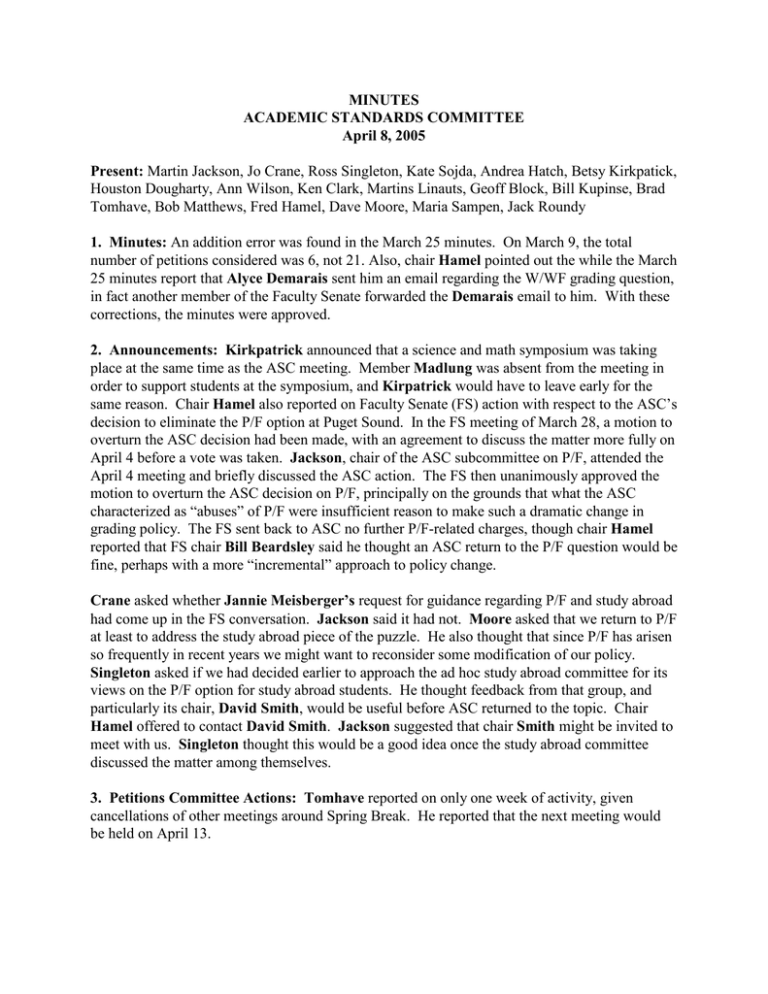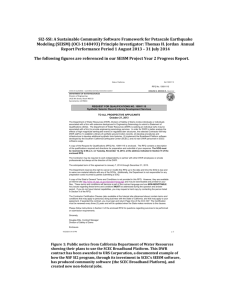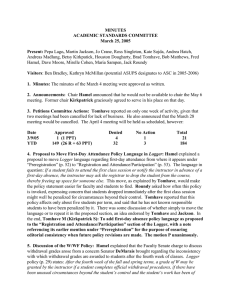MINUTES ACADEMIC STANDARDS COMMITTEE April 8, 2005 Present:
advertisement

MINUTES ACADEMIC STANDARDS COMMITTEE April 8, 2005 Present: Martin Jackson, Jo Crane, Ross Singleton, Kate Sojda, Andrea Hatch, Betsy Kirkpatick, Houston Dougharty, Ann Wilson, Ken Clark, Martins Linauts, Geoff Block, Bill Kupinse, Brad Tomhave, Bob Matthews, Fred Hamel, Dave Moore, Maria Sampen, Jack Roundy 1. Minutes: An addition error was found in the March 25 minutes. On March 9, the total number of petitions considered was 6, not 21. Also, chair Hamel pointed out the while the March 25 minutes report that Alyce Demarais sent him an email regarding the W/WF grading question, in fact another member of the Faculty Senate forwarded the Demarais email to him. With these corrections, the minutes were approved. 2. Announcements: Kirkpatrick announced that a science and math symposium was taking place at the same time as the ASC meeting. Member Madlung was absent from the meeting in order to support students at the symposium, and Kirpatrick would have to leave early for the same reason. Chair Hamel also reported on Faculty Senate (FS) action with respect to the ASC’s decision to eliminate the P/F option at Puget Sound. In the FS meeting of March 28, a motion to overturn the ASC decision had been made, with an agreement to discuss the matter more fully on April 4 before a vote was taken. Jackson, chair of the ASC subcommittee on P/F, attended the April 4 meeting and briefly discussed the ASC action. The FS then unanimously approved the motion to overturn the ASC decision on P/F, principally on the grounds that what the ASC characterized as “abuses” of P/F were insufficient reason to make such a dramatic change in grading policy. The FS sent back to ASC no further P/F-related charges, though chair Hamel reported that FS chair Bill Beardsley said he thought an ASC return to the P/F question would be fine, perhaps with a more “incremental” approach to policy change. Crane asked whether Jannie Meisberger’s request for guidance regarding P/F and study abroad had come up in the FS conversation. Jackson said it had not. Moore asked that we return to P/F at least to address the study abroad piece of the puzzle. He also thought that since P/F has arisen so frequently in recent years we might want to reconsider some modification of our policy. Singleton asked if we had decided earlier to approach the ad hoc study abroad committee for its views on the P/F option for study abroad students. He thought feedback from that group, and particularly its chair, David Smith, would be useful before ASC returned to the topic. Chair Hamel offered to contact David Smith. Jackson suggested that chair Smith might be invited to meet with us. Singleton thought this would be a good idea once the study abroad committee discussed the matter among themselves. 3. Petitions Committee Actions: Tomhave reported on only one week of activity, given cancellations of other meetings around Spring Break. He reported that the next meeting would be held on April 13. Date 4/6/05 YTD Approved 8 (2 R + 5 PPT) 157 (26 R + 63 PPT) Denied 2 34 No Action 0 3 Total 10 194 4. Proposal to Eliminate WF Grade: Hamel returned us to the motion made on March 25 to eliminate the WF grade and move the deadline for withdrawal from classes to a point two weeks following the midterm grading deadline. Tomhave reported on research done in the Registrar’s Office (table attached) on withdrawal grading policies of sister institutions. Because his table did not include data from WSU he had just received, Tomhave described their unusual arrangement, which is to permit a maximum of four W grades during a student’s career, to be taken at any time. Singleton noted that the UW’s system looks much like the one our proposal suggests; in the early term, a drop is permitted without record, then for several weeks an automatic W is awarded, and toward the end of term a student must accept an A-F grade without a withdrawal option. Roundy reported that Colby College has an arrangement (for freshmen only) in which W and WF grades are awarded at any point in the term. WF grades at Colby appear on the transcript but do not count in the GPA. Tomhave said he thought the system embodied in the Singleton motion most resembles the one at PLU. Singleton said that as the motion maker he had become uncomfortable with allowing only two weeks after midterm for students to withdraw with a W, and wondered if he could amend his own motion to allow a longer period on the grounds that students would then have more time to respond to academic jeopardy they learn about at midterm. He said he preferred PLU’s later cutoff date. Sojda preferred the earlier date of the motion, saying she thought a 12th week cut-off was too late. Kirkpatrick said many of her frosh may have poor midterm grades because of an early midterm, and won’t have information from a second exam to know if they have turned things around by the proposed withdrawal deadline. Jackson said he thought a longer W period makes sense, and that late in term, should problems arise, an incomplete grade could be the solution to a legitimate student emergency. Tomhave said he thought our current W/WF system allows student escape for legitimate emergencies. Hamel, scanning the table of sister institutions, said he thought we look like an outlier, but also said he thought our W/WF system works well. He was especially sensitive to Sojda’s hypothetical situation from our earlier meeting in which a responsible and an irresponsible student receive the same W grade late in term—he thought that would be unfair. For that reason, he was reluctant to see us allow a 12week W period in which students could freely walk away. Singleton replied that students don’t walk away free with a W; they lose academic credit. Sojda answered that a student departing a course late in term has already paid for it, so for her the only difference between two students departing the course would be their grades—if an irresponsible fellow student also received a W, she thought that person would be walking away free by comparison. Tomhave said he didn’t know how many students we have dismissed because of WF grades would still be with us if we eliminated that grade. He wondered if it would be good for them or for us to still be enrolled. Hatch said she thought a benefit of a longer W period followed by mandatory A-F grading would be the chance for struggling students to pull up their grades late. Matthews said his stake in this decision was not to write a rule that reduces his flexibility to work with struggling students. In that spirit, Singleton said, he would like to amend his motion to extend the W period to the 12th week, like PLU’s policy. Matthews said that Singleton’s proposed amendment was OK with him as seconder. Lacking a parliamentarian, we did not know whether an amendment by the motion maker was permissible. The discussion continued, with Sojda arguing for a deadline one week after midterm. Clark responded that he gives his second midterm in the 11th week, and said he’d favor that week as a deadline. Hatch said she found it hard to believe students wouldn’t know how serious their problems in a course were before the 11th week; if they haven’t been putting the work in all term, an 11th week W allows them to avoid the consequences. She said she was uncomfortable moving the W from the 4th week to the 11th with this policy change. Moore said he didn’t always know why his students were struggling, and more time for them to turn things around would be good. Sampen asked about our policy on repeating courses, and the feature allowing a student to replace a poor grade in the GPA by retaking the course. Doesn’t the possibility of a repeat provide an out for a student who must accept an A-F grade after midterm? Matthews said there were instances where the repeat was not helpful, as in the case of an upper division course he offers only every other year—few students would be around long enough to take this course again if they did poorly the first time. He added that he liked the motion as written, but wondered if we shouldn’t have the option of a petition to withdraw for extenuating circumstances, with the requirement that the instructor report the current grade on the petition. Moore returned our discussion to the charge given by the FS, which was to address the question of “consistency” in withdrawal grading. He thought a cut-off for withdrawal was one way to achieve consistency. He also pointed out that we differ from sister institutions in how early in term the W deadline is. He suggested moving the WF period back to the 6th week, then continuing the W/WF system (with a WF not counted in the GPA) or replace it with a Late Withdrawal grade. Hamel said we might also look at how to make the implementation of our current policy more consistent. Crane replied that she didn’t think we could police faculty W/WF grading. Hamel said he was not persuaded that we couldn’t hold faculty to demonstrate their rationale for grading decisions. He said he was also reluctant to have us forward another wholesale academic policy change to the FS, given their reaction to our decision on P/F policy. Sampen wondered if we could ask the FS to clarify what they would like us to do, in light of this discussion? Crane added that we could forward Tomhave’s table as background. Hamel replied by invoking Finney’s remark that our W/WF policy has been around for at least 30 years, which says something about its durability. Tomhave replied that inconsistency in WF grading has been around just as long. Moore argued that it is impossible to achieve consistency with the policy as it is. Hamel responded that consistency may not assure fairness. Jackson suggested that a longer W period, at the very least, could make the W/WF decision easier and clearer. Singleton agreed, saying we could extend the W period to the 12th week, and keep the WF thereafter if that seemed more palatable. Tomhave replied that the major problem with consistency is the case of a single student, having done the same amount of work in all her classes (usually very little), who then approaches her four instructors and receives differing answers on withdrawal grading. This inconsistency is manifest at any point in term. Roundy concurred, saying it was his experience that this inconsistency persists through the last day of classes. Singleton retracted his suggestion that the WF be retained for any part of the term. Crane said it made sense to move from the W deadline, wherever we set it, to A-F grading, then. Sampen, thinking about the use of petitions for a W grade after a later deadline in term (say, 12 weeks), said she believed the petition process could create timing issues for students who would not know whether to go to class while waiting for a decision. Hatch thought this problem could be addressed by having a 10-week W period followed by a 2-week LW period (by petition), followed by A-F grading to end the term. At this point Hamel recommended that we continue our discussion at the next meeting, being careful to supply a solid rationale for any decision we might make that would significantly alter our policy. He said he thought the FS might return the matter to us if our rationale for change was not well articulated. Matthews, as a parting shot, said he was becoming more and more convinced that we should not add a petition step to our withdrawal policy. Roundy requested that Hamel contact the FS chair to invite senators to read ASC minutes so as to advise us if they have an approach in mind for us in addressing the W/WF charge. With that, we adjourned at 5:00. Respectfully submitted by the ASC amanuensis, Jack Roundy University of Puget Sound Colorado College Gonzaga University Pacific Lutheran University Reed College Seattle Pacific University Seattle University University of Washington Washington State University Whitman College Whitworth College Willamette University Williams College Drop without Record Failure No Withdrawal - Grade Earned Late Withdrawal (by petition), otherwise non-punitive Unofficial Withdrawal Late Withdrawal (by petition with $50 fee), otherwise grade earned or failing "unofficial withdrawal." Drop with "W' Withdrawal with Failing Grade Week 1 DWR DWR DWR DWR DWR DWR W DWR DWR DWR W Week 2 DWR F DWR DWR DWR W W DWR DWR DWR W Week 3 W F W W DWR W W W3 DWR DWR W W W W DWR F GR LW V W WF Week Week Week Week Week Week Week Week Week Week Week Week 4 5 6 7 8 9 10 11 12 13 14 15 W WF WF WF WF WF WF WF WF WF WF WF W W W W W W DWR DWR DWR W W W W W W W4 W5 W6 DWR DWR DWR DWR DWR DWR W W W W W W W W W GR LW W7 W W W W W W GR LW W8 W W W W W W GR LW GR W W W V W GR GR LW GR W W W V W GR V W GR V GR GR V GR GR V GR GR F F F F F W W W W GR GR GR GR GR



